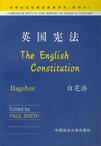英国宪法
出版时间:2003-5 出版社:政法大学 作者:白芝浩 页数:253
Tag标签:无
内容概要
在政治理论领域,“剑桥政治思想史原著系列”作为主要的学生教科丛书,如今已牢固确立了其地位。《剑桥政治思想史原著系列:英国宪法(影印本)》旨在使学生能够获得从古希腊到20世纪初期西方政治思想史方面所有最为重要的原著。它囊括了所有著名的经典原著,但与此同时,它又扩展了传统的评价尺度,以便能够纳入范围广泛、不那么出名的作品。而在此之前,这些作品中有许多从未有过现代英文版本可资利用。只要可能,所选原著都会以完整而不删节的形式出版,其中的译作则是专门为本丛书的目的而安排。每一本书都有一个评论性的导言,加上历史年表、生平梗概、进一步阅读指南,以及必要的词汇表和原文注解。《剑桥政治思想史原著系列:英国宪法(影印本)》的最终目的是,为西方政治思想的整个发展脉络提供一个清晰的轮廓。
书籍目录
Editor’s introductionPrincipal events in Bagehot’s lifeNote on the text and annotationThe English ConstitutionAdvertisementⅠThe CabinetⅡ The Prerequisites of Cabinet Government,and the Peculiar Form Which They Have Assumed in EnglandⅢ TheMonarchyⅣ The Monarchy (continued)Ⅴ The House of LordsⅥ The House of CommonsⅦ On Changes of MinistryⅧ Its Supposed Checks and BalancesⅨ Its History, and the Effects of That History-ConclusionIntroduction to the Second Edition (1872)Biographical notes on persons mentioned in the textBibhographical noteIndex
章节摘录
The third function of Parliament is what I may call - preserving a sort of technicality even in familiar matters for the sake of distinctness - the teaching function。 A great and open council of considerable men cannot be placed in the middle of a society without altering that society。 It ought to alter it for the better。 It ought teach the nation what it does not know。 How far the House of Commons can so teach, and how far it does so teach,are matters for subsequent discussion。 Fourthly, the House of Commons has what may be called an informing function - a function which though in its present form quite modern is singularly analogous to a mediaeval function。 In old times one office of the House of Commons was to inform the sovereign what was wrong。 It Iaid before the crown the grievances and complaints of particular inter-ests。 Since the publication of the parliamentary debates a corresponding office of Parliament is to lay these same grievances, these same com-plaints, before the nation, which is the present sovereign。 The nation needs it quite as much as the king ever needed it。 A free people is indeed mostly fair, liberty practises men in a give-and-take, which is the rough essence of justice。 The English people, possibly even above other free nations, is fair。 But a free nation rarely can be - and the English nation is not - quick of apprehension。 It only comprehends what is familiar to it; what comes into its own experience, what squares with its own thoughts。clnever heard of such a thing in my life, the middle-class Englishman says, and he thinks he so refutes an argument。 The common disputant cannot say in reply that his experience is but limited, and that the asser-tion may be true, though he had never met with anything at alllike it。 But a great debate in Parliament does bring home something of this feeling。 Any notion, any creed, any feeling, any grievance which can get a decent number of English members to stand up for it, is felt by almost all Englishmen to be perhaps a false and perrucious opinion, but at any rate possible - an opinion within the intellectual sphere, an opinion to be reck-oned with。 And it is an immense achievement。 Practical diplomatists say that a free government is harder to deal with than a despotic government: you may be able to get the despot to hear the other side; his ministers, men of trained intelligence, will be sure to know what makes against them; and they may tell him。 But a free nation never hears any side save its own。 The newspapers only repeat the side their purchasers like: the favourable arguments are set out, elaborated, illustrated; the adverse argumentsmaimed, misstated, confused。 The worst judge, they say, is a deaf judge; the most dull government is a free government on matters its ruling classes will not hear。 I am disposed to reckon it as the second function of Parliament in point of importance, that to some extent it makes us hear what otherwise we should not。 Lastly, there is the function of legislation, of which of course it would be preposterous to deny the great importance, and which I only deny to be as important as the executive management of the whole state, or the polit-ical education given by Parliament to the whole nation。 There are, I allow,seasons when legislation is more important then either of these。 The nation may be misfitted with its laws, and need to change them: some particular corn law may hurt allindustry, and it may be worth a thousand administra-tive blunders to get rid of it。 But generally the laws of a nation suit its life;special adaptations of them are but subordinate; the administration and conduct of that life is the matter which presses most。 Nevertheless, the statute-book of every great nation yearly contains many important new laws, and the English statute-book does so above any。 An immense mass, indeed, of the legislation is not, in the proper language of jurisprudence,legislation at all。 A law is a general command applicable to many cases。 The special acts’ which crowd the statute-book and weary parliamentary com-mittees are applicable to one case only They do not lay down rules accord- ing to which railways shall be made, they enact that such a railway shall be made from this place to that place, and they have no bearing upon any other transaction。 But after every deduction and abatement, the annual legislation of Parliament is a result of singular importance; were it not so, it could not be, as it often is considered, the sole result ofits annual assembling。 ……
图书封面
图书标签Tags
无
评论、评分、阅读与下载
